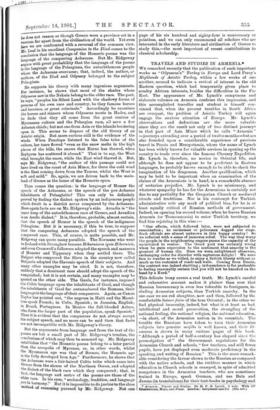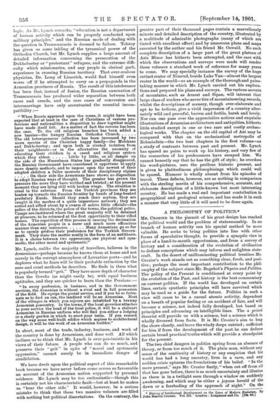TRAVELS AND STUDIES IN ARMENIA.*
WE remarked recently that the publication of such important works as "Odysseus's" Turkey in Europe and Lord Percy's Highlands of Asiatic Turkey, within a few weeks of one another, seemed to indicate a revival of interest in the old Eastern question, which had temporarily given place to
sundry African interests, besides the difficulties in the Far East. The appearance of Mr. Lynch's sumptuous and elaborate volumes on Armenia confirms this impression, and this accomplished traveller and student is himself con- vinced that, when the present troubles in South Africa are overpast, the problem of Asiatic Turkey will again engage the anxious attention of Europe. Mr. Lynch's observations and deductions are the more valuable since they are the result not only of two distinct journeys in that part of Asia Minor which he calls " Armenia " —journeys extending over a period of twelve months—but are also founded upon a considerable experience of previous travel in Persia and Mesopotamia, where the name of Lynch has been widely known for valuable services in opening up the country to trade ever since the famous Chesney Expedition.
Mr. Lynch is, therefore, no novice in Oriental life, and although he does not appear to be proficient in Eastern languages, he probably knows enough to be able to check the imagination of his dragoman. Another qualification, which may be held to be important when an examination of the claims of the Armenians is in hand, is a remarkable absence of sectarian prejudice. Mr. Lynch is no missionary, and whatever sympathy he has for the Armenians is certainly not due to any partiality for the Gregorian Church or mediieval rituals and traditions. Nor is his contemilt for Turkish administrative rule any mark of political bias, for he is at least equally critical of Russian methods of government.
Indeed, on opening his second volume, when he leaves Russian Armenia (or Transcaucasia) to enter Turkish territory, we find him rejoicing in this wise :—
" Our effects, which followed later, were not subjected to examination ; no exciseman or policeman dogged our steps. Such officials are almost unknown in this happy country ! So we reflected with a sense of immense relief. The way they worry the people in the neighbouring empire passes the capacity of the uninitiated to realise. The ereek poet was certainly wrong when he gave expression to the sentiment that anarchy is the greatest of human ills. Here we were, enlightened observers, exchanging order for disorder with rapturous delight ! We were free to wander as we willed, to enjoy a British liberty without so much as the restraint of roads and walls. Coming from Russia, the contrast was indeed startling ; independence is far preferable to feeling reasonably certain that you Will not be knocked on the head by a Kurd."
This delicate irony covers a real truth. Mr. Lynch's careful and exhaustive account makes it plainer than ever that Russian bureaucracy is even less tolerable to foreigners, in- cluding Armenian subjects, than Turkish anarchy. In the one case we see red slaughter, now and then, followed by the
comfortable kisser fairs of the true Oriental ; in the other we find physical immunity, indeed, but what is at least as bad, intellectual and moral persecution, the strangling of the national feeling, the national religion,• the national education, —in short, of the Armenian nation in its essentials. The trouble the Russians have taken to turn their Armenian subjects into genuine mujiks is well. known, and their ill- success is shown in many curious 'pages of this book.
"Although a period of half-a-century has elapsed since the promulgation of" the Government regulations for the Armenian Church and schools, "few teachers, and still fewer pupils, have yet displayed even moderate proficiency in the speaking and writing of Russian." This is the more remark- able considering the favour shown to the Russian as compared with the native schools, and the ruthless manner in which
education in Church schools is cramped, in spite of admitted competence in the Armenian teachers, who are sometimes trained in Europe, speak German, and use Bain and Jevons (in translations) for their text-books in psychology and
• Armenia: Trarets and Studies. By IL F. B. Lynch. 2 vols. With 327 2222112.tious, Maps, and Plans. Loudon Longnaana and Co. [eta net]
logic. As Mr. Lynch remarks, "education is not a department of human activity which can be properly conducted upon military principles," and the Russian mode of dealing with the question in Transcaucasia is doomed to failure. Tolstoy has given us some inkling of the tyrannical power of the Orthodox Church, but Mr. Lynch supplies a large amount of detailed information concerning the persecution of the Dukhobortsy or "protestant" refugees, and the extreme diffi- culty which missionaries, and any people in clerical garb, experience in crossing Russian territory. That over-zealous physician, Dr. Long of Limerick, would find himself even worse off if he attempted to carry on a propaganda in the Armenian provinces of Russia. The result of this intolerance has been that, instead of fusion, the Russian annexation of Transcaucasia has produced wider separation between both races and creeds, and the rare cases of conversion and intermarriage have only accentuated the essential incom- patibility :—
"When Russia appeared upon the scene, it might have been expected that at least in the case of Christians of various pro- fessions and nationalities a disposition to draw together might have made itself felt. As a matter of fact the reverse has been the case. To the old religious breaches has been added a
new barrier—the hungry Russian Orthodox Church. The old heterogeneous collection has been increased by two more species of the Christian happy family—the Molokans and Dukhobortsy ; and upon both is riveted isolation from their neighbours—or in the alternative the necessity of educating their children in a creed and religious system which they abhor Little by little, as all danger on the aide of the Mussulman States has gradually disappeared, the Russian Government have considered it opportune to apply more drastic methods, and to impose upon the newest of their adopted children a fuller measure of their disciplinary regime
On their side the Armenians have shown no disposition to adopt Russian ways of thought. The greater has grown the pressure the more they have writhed and twisted; at the present moment they are lying still with broken wings. The situation is cruel in the extreme. From the Turkish provinces they are beaten up towards the Russian frontier by bands of long-beaked predatory Kurds. Should they reach their asylum, they are caught in the meshes of a quite impervious network; they are sorted and sifted about by a swarm of active little officials—the police of the districts, the police of the towns, the political police. Camps are instituted where the great majority will be detained at pleasure, to be returned at the first opportunity to their rifled homes. The repetition of this process is causing the decimation of the Armenian people in a surer and much more efficacious
manner than any massacres Many Armenians go so far as to openly profess their preference for the Turkish Govern- ment. They state the matter neatly in the form of an antithesis. It is a choice between two oppressions, one physical and spas- modic, the other moral and systematic."
Mr. Lynch, unlike the majority of travellers, believes in the Armenians—perhaps because he knows them at home and not merely in the corrupt atmosphere of Levantine ports—and he deplores what he fears will be their probable extinction by the sure and cruel methods he describes. He finds in them what Is popularly termed "grit." They have more depth of character than the Greeks (as might easily be), with equal business aptitudes, and they are quicker to learn than the Persians :— "In every profession, in business, and in the Government services, the Armenian is without a rival and in full possession of the field. He equips the postal service, and if you be so fortu- nate as to find an inn, the landlord will be an Armenian. Most of the villages in which you sojourn are inhabited by a brawny Armenian peasantry. In the towns, if the local governor attaches to your service the head of the local police, it will be a stalwart Armenian in Russian uniform who will find you either a lodging or a shady garden in which to erect your tents. If you remark on the way some well-built edifice which aspires to architectural design, it will be the work of an Armenian builder."
In short, most of the trade, industry, business, and work of the country is done by Armenians, and done well. All which inclines us to think that Mr. Lynch is over-pessimistic in his views of their future. A people who can do so much, and preserve their "grit" in spite of "moral and systematic oppression," cannot surely be in immediate danger of
annihilation.
We have dwelt upon the political aspect of this remarkable book because we have never before come across so favourable an account of the Armenian nation supported by personal evidence. Mr. Lynch may be too enthusiastic—though this is certainly not his characteristic fault—but at least he makes us "hear the other side." It would, however, be a serious mistake to think that these two massive volumes are filled with nothing but political dissertations. On the contrary, the
greater part of their thousand pages contain a marvellously minute and detailed description of the country, illustrated by a multitude of admirable photographs (many of which are tinted with excellent effect) and by numerous plans and maps executed by the author and his friend Mr. Oswald. No such complete description of a large part of the great plateau of Asia Minor has hithertp been attempted, and the care with which the observations and surveys were made will render these volumes a standard work of reference for many years to come. We may specially instance the survey of the huge extinct crater of Ninumd, beside Lake Van—almost the largest crater in the world—as an example of the thorough and pains- taking manner in which Mr. Lynch carried out his explora- tions and prepared his plans and surveys. The various ascents of mountains, such as Ararat and Sipan, will interest that large class of readers who never tire of mountaineering records, whilst the descriptions of scenery, though over-elaborate and apt to be tedious, give a vivid impression of a country alter- nately wild and peaceful, barren and fertile, harsh and lovely. Nor can one pass over the appreciative notices and exquisite illustrations of Armenian architecture and antiquities, hitherto little studied except in one or two rare and costly archteo- logical works. The chapter on the old capital of Ani may be compared with that on the ecclesiastical metropolis of Echmiadzin—the two best chapters in the first volume—as a study of contrasts between past and present. Mr. Lynch has spared no pains to work up his history, and very few of the researches of his predecessors have escaped him. We cannot honestly say that he has the gift of style ; he overdoes his word-pictures, uses the perilous historic present, and is given to platitudinous philosophisings which could well be spared. Humour is wholly absent from his episodes of travel. These defects, however, are as nothing in comparison with the sterling merits of his comprehensive, accurate, and elaborate description of a little-known but most interesting country. He has made a real and important contribution to geographical and geological science, and has made it in such a manner that very little of it will need to be done again,







































 Previous page
Previous page